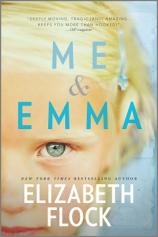Interview: March 4, 2005
March 4, 2005
Bookreporter.com Co-Founder Carol Fitzgerald and contributing writer Shannon McKenna interviewed Elizabeth Flock, author of ME & EMMA. Flock discusses the inspiration behind her second novel, the heart-rending research necessary to realistically portray childhood trauma, the alluring charms of the South, and how her journalism skills have helped her in her fiction writing.
Bookreporter.com: Where did the idea for ME & EMMA originate --- was it with a particular character or aspect of the storyline, or something else?
Elizabeth Flock: I have to say, and I used to hate hearing writers say this until I experienced it myself, the idea just came to me. Just like that, Carrie appeared and began whispering in my ear. Having said that I will say that I have always been fascinated with the notion that our inner realities many times do not match what the rest of the world experiences. In other words, appearances can deceive. And that concept has intrigued me from the very beginning of my writing. So I suppose the broader idea for the book was already simmering somewhere inside.
BRC: ME & EMMA is written in Carrie's very distinctive voice. Was it difficult to maintain the voice of an 8-year-old narrator? How did you make sure to keep her dialogue and actions consistent with what an 8-year-old might actually say and do?
EF: I love the way children see the world. In writing this book I so enjoyed closing my eyes and imagining what Carrie was seeing. Maybe it is the child in me that made it somewhat easy at times to stay "in character," I don't know.
BRC: Did you write the book straight through, or did you construct the scenes in the present and the past separately and then combine them?
EF: I wrote the book straight through.
BRC: Is it difficult for you to write passages in which your characters are feeling hurt and pain?
EF: Frankly, no. Only because, by the time I had come to writing the book, I'd done so much heartbreaking research into child abuse and childhood trauma that it perhaps inured me against feeling hurt for my girls.
BRC: You have said that you like writing stories that take place in the South. What draws you to this part of the country?
EF: My father is from Texas and I spent many a family vacation visiting relatives there. I couldn't resist its pull for college so I spent four years in Nashville, Tennessee, loving every minute of it. And, I might add, making lifelong Southern friends. Most of all, Southern writers are among my favorites: Eudora Welty, Flannery O'Connor, Harper Lee, William Faulkner, Pat Conroy, Michael Malone, Tony Earley. I could go on and on.
BRC: Is the town of Toast fictional?
EF: There is a Toast, North Carolina. It bears little to no resemblance to the Toast in my book, which is an amalgam of many towns I visited in preparation for the writing.
BRC: You succinctly captured the feel of a rural North Carolina town. Have you done reporting in this part of the country in your past career as a journalist, or did you spend time there in order to write this book?
EF: Thank you. I love North Carolina, so I more or less used the book and research as excuses to go visit a dear friend and drive around the state in search of my story. In search of Carrie's story. I had a ball, ate truck stop food, got lost, listened to some wonderful bluegrass, and found exactly what I was looking for.
BRC: Has your training as a journalist helped you with your fiction, in terms of writing or research?
EF: Absolutely. Journalism requires a fair amount of curiosity and detective work. I certainly think my curiosity came in handy in my job as a reporter and served me well in my researching North Carolina, childhood trauma, mountain life, rural architecture, farmsteads, you name it.
BRC: What do you enjoy about being a novelist? What did you enjoy about being a journalist?
EF: I love storytelling. I think that is at the root of both crafts. And that is something I love most about the South, the storytelling.
BRC: How was this experience different from that of writing your first novel, BUT INSIDE I'M SCREAMING?
EF: I learned so much during the writing of BUT INSIDE. I had to write that book in order to be ready for ME & EMMA. I had to write that book, period. It exorcised a lot of demons for me and helped me move forward. ME & EMMA was a joy to work on.
BRC: Which writers have influenced you?
EF: William Maxwell continues to influence me in that his writing is something to aspire to, so crisp, so achingly beautiful. He is the master. I read and re-read him often. Tony Earley is another writer I admire. His attention to detail is phenomenal. Theodore Drieser's SISTER CARRIE was a huge influence on me.
BRC: What are you working on now and when can readers expect to see it?
EF: I am working on my third novel now and hope to have it out by next summer.




